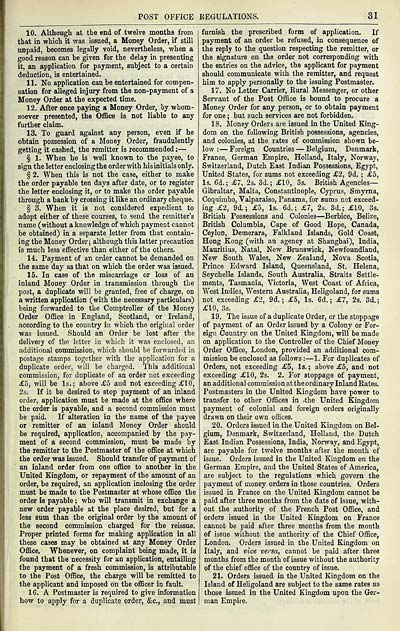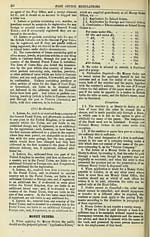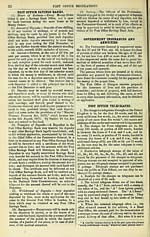Download files
Complete book:
Individual page:
Thumbnail gallery: Grid view | List view

POST OFFICE REGULATIONS.
31
10. Although at the end of twelve months from
that in which it was issued, a Money Order, if still
unpaid, becomes legally void, nevertheless, when a
good reason can be given for the delay in presenting
it, an application for payment, subject to a certain
deduction, is entertained.
11. No application can be entertained for compen-
sation for alleged injury from the non-payment of a
Money Order at the expected time.
12. After once paying a Money Order, by whom-
soever presented, the Office is not liable to any
further claim.
13. To guard against any person, even if he
obtain possession of a Money Order, fraudulently
getting it cashed, the remitter is recommended ; —
§ 1. When he is well known to the payee, to
sign the letter enclosing the order with his initials only.
§ 2. When this is not the case, either to make
the order payable ten days after date, or to register
the letter enclosing it, or to make the order payable
through a bank by crossing it like an ordinary cheque.
§ 3. When it is not considered expedient to
adopt either of these courses, to send the remitter's
name (without a knowledge of which payment cannot
be obtained) in a separate letter from that contain-
ing the Money Order; although this latter precaution
is much less effective than either of the others.
14. Payment of an order cannot be demanded on
the same day as that on which the order was issued.
15. In case of the miscarriage or loss of an
inland Money Order in transmission through the
post, a duplicate will be granted, free of charge, on
a written application (with the necessary particulars)
being forwarded to the Comptroller of the Money
Order Office in England, Scotland, or Ireland,
according to the country in which the original order
was issued. Should an Order be lost after the
delivery of the letter in which it was enclosed, an
additional commission, which should be forwarded in
postage stamps together with the application for a
duplicate order, will be charged. This additional
commission, for duplicate of an order not exceeding
£5, will be Is.; above £5 and not exceeding £10,
2s. If it be desired to stop payment of an inland
order, application must be made at the office where
the order is payable, and a second commission must
be paid. If alteration in the name of the payee
or remitter of an inland Money Order should
be required, application, accompanied by the pay-
ment of a second commission, must be made by
the remitter to the Postmaster of the office at which
the order was issued. Should transfer of payment of
an inland order from one office to another in the
United Kingdom, or repayment of the amount of an
order, be required, an application inclosing the order
must be made to the Postmaster at whose office the
order is payable ; who will transmit in exchange a
new order payable at the place desired, but for a
less sum than the original order by the amount of
the second commission charged for the reissue.
Proper printed forms for making application in all
these cases may be obtained at any Money Order
Office. Whenever, on complaint being made, it is
found that the necessity for an application, entailing
the payment of a fresh commission, is attributable
to the Post Office, the charge will be remitted to
the applicant and imposed on the officer in fault.
16. A Postmaster is required to give information
how to apply for a duplicate order, &c., and must
furnish the prescribed form of application. If
payment of an order be refused, in consequence of
the reply to the question respecting the remitter, or
the signature on the order not corresponding with
the entries on the advice, the applicant for payment
should communicate with the remitter, and request
him to apply personally to the issuing Postmaster.
17. No Letter Carrier, Rural Messenger, or other
Servant of the Post Office is bound to procure a
Money Order for any person, or to obtain payment
for one ; but such services are not forbidden.
18. Money Orders are issued in the United King-
dom on the following British possessions, agencies,
and colonies, at the rates of commission shown be-
low : — Foreign Countries — Belgium, Denmark,
France, German Empire, Holland, Italy, Norway,
Switzerland, Dutch East Indian Possessions, Egypt,
United States, for sums not exceeding £2, 9d. ; £5,
Is. 6d. ; £7, 2s. 3d.; £10, 3s. British Agencies —
Gibraltar, Malta, Constantinople, Cyprus, Smyrna,
Coquimbo, Valparaiso, Panama, for sums not exceed-
ing £2, 9d.; £5, Is. 6d. ; £7, 2s. 3d.; £10, 3s.
British Possessions and Colonies — Berbice, Belize,
British Columbia, Cape of Good Hope, Canada,
Ceylon, Demerara, Falkland Islands, Gold Coast,
Hong Kong (with an agency at Shanghai), India,
Mauritius, Natal, New Brunswick, Newfoundland,
New South Wales, New Zealand, Nova Scotia,
Prince Edward Island, Queensland, St. Helena,
Seychelle Islands. South Australia, Straits Settle-
ments, Tasmania, Victoria, West Coast of Africa,
West Indies, Western Australia, Heligoland, for sums
not exceeding £2, 9d. ; £5, Is. 6d. ; £7, 2s. 3d.;
£10, 3s.
19. The issue of a duplicate Order, or the stoppage
of payment of an Order issued by a Colony or For-
eign Country on the United Kingdom, will be made
on application to the Controller of the Chief Money
Order Office, London, provided an additional com-
mission be enclosed as follows : — 1. For duplicates of
Orders, not exceeding £5, Is. ; above £5, and not
exceeding £10, 2s. 2. For stoppage of payment,
an additional commission at the ordinary Inland Rates.
Postmasters in the United Kingdom have power to
transfer to other Offices in -the United Kingdom
payment of colonial and foreign orders originally
drawn on their own offices.
20. Orders issued in the United Kmgdom on Bel-
gium, Denmark, Switzerland, Holland, the Dutch
East Indian Possessions, India, Norway, and Egypt,
are payable for twelve months after the month of
issue. Orders issued in the United Kingdom on the
German Empire, and the United States of America,
are subject to the regulations which govern the
payment of money orders in those countries. Orders
issued in France on the United Kingdom cannot be
paid after three months from the date of issue, with-
out the authority of the French Post Office, and
orders issued in the United Kingdom on France
cannot be paid after three months from the month
of issue without the authority of the Chief Office,
London. Orders issued in the United Kingdom on
Italy, and vice versa, cannot be paid after three
months from the month of issue without the authority
of the chief office of the country of issue.
21. Orders issued in the United Kingdom on the
Island of Heligoland are subject to the same rates as
those issued in the United Kingdom upon the Ger-
man Empire.
31
10. Although at the end of twelve months from
that in which it was issued, a Money Order, if still
unpaid, becomes legally void, nevertheless, when a
good reason can be given for the delay in presenting
it, an application for payment, subject to a certain
deduction, is entertained.
11. No application can be entertained for compen-
sation for alleged injury from the non-payment of a
Money Order at the expected time.
12. After once paying a Money Order, by whom-
soever presented, the Office is not liable to any
further claim.
13. To guard against any person, even if he
obtain possession of a Money Order, fraudulently
getting it cashed, the remitter is recommended ; —
§ 1. When he is well known to the payee, to
sign the letter enclosing the order with his initials only.
§ 2. When this is not the case, either to make
the order payable ten days after date, or to register
the letter enclosing it, or to make the order payable
through a bank by crossing it like an ordinary cheque.
§ 3. When it is not considered expedient to
adopt either of these courses, to send the remitter's
name (without a knowledge of which payment cannot
be obtained) in a separate letter from that contain-
ing the Money Order; although this latter precaution
is much less effective than either of the others.
14. Payment of an order cannot be demanded on
the same day as that on which the order was issued.
15. In case of the miscarriage or loss of an
inland Money Order in transmission through the
post, a duplicate will be granted, free of charge, on
a written application (with the necessary particulars)
being forwarded to the Comptroller of the Money
Order Office in England, Scotland, or Ireland,
according to the country in which the original order
was issued. Should an Order be lost after the
delivery of the letter in which it was enclosed, an
additional commission, which should be forwarded in
postage stamps together with the application for a
duplicate order, will be charged. This additional
commission, for duplicate of an order not exceeding
£5, will be Is.; above £5 and not exceeding £10,
2s. If it be desired to stop payment of an inland
order, application must be made at the office where
the order is payable, and a second commission must
be paid. If alteration in the name of the payee
or remitter of an inland Money Order should
be required, application, accompanied by the pay-
ment of a second commission, must be made by
the remitter to the Postmaster of the office at which
the order was issued. Should transfer of payment of
an inland order from one office to another in the
United Kingdom, or repayment of the amount of an
order, be required, an application inclosing the order
must be made to the Postmaster at whose office the
order is payable ; who will transmit in exchange a
new order payable at the place desired, but for a
less sum than the original order by the amount of
the second commission charged for the reissue.
Proper printed forms for making application in all
these cases may be obtained at any Money Order
Office. Whenever, on complaint being made, it is
found that the necessity for an application, entailing
the payment of a fresh commission, is attributable
to the Post Office, the charge will be remitted to
the applicant and imposed on the officer in fault.
16. A Postmaster is required to give information
how to apply for a duplicate order, &c., and must
furnish the prescribed form of application. If
payment of an order be refused, in consequence of
the reply to the question respecting the remitter, or
the signature on the order not corresponding with
the entries on the advice, the applicant for payment
should communicate with the remitter, and request
him to apply personally to the issuing Postmaster.
17. No Letter Carrier, Rural Messenger, or other
Servant of the Post Office is bound to procure a
Money Order for any person, or to obtain payment
for one ; but such services are not forbidden.
18. Money Orders are issued in the United King-
dom on the following British possessions, agencies,
and colonies, at the rates of commission shown be-
low : — Foreign Countries — Belgium, Denmark,
France, German Empire, Holland, Italy, Norway,
Switzerland, Dutch East Indian Possessions, Egypt,
United States, for sums not exceeding £2, 9d. ; £5,
Is. 6d. ; £7, 2s. 3d.; £10, 3s. British Agencies —
Gibraltar, Malta, Constantinople, Cyprus, Smyrna,
Coquimbo, Valparaiso, Panama, for sums not exceed-
ing £2, 9d.; £5, Is. 6d. ; £7, 2s. 3d.; £10, 3s.
British Possessions and Colonies — Berbice, Belize,
British Columbia, Cape of Good Hope, Canada,
Ceylon, Demerara, Falkland Islands, Gold Coast,
Hong Kong (with an agency at Shanghai), India,
Mauritius, Natal, New Brunswick, Newfoundland,
New South Wales, New Zealand, Nova Scotia,
Prince Edward Island, Queensland, St. Helena,
Seychelle Islands. South Australia, Straits Settle-
ments, Tasmania, Victoria, West Coast of Africa,
West Indies, Western Australia, Heligoland, for sums
not exceeding £2, 9d. ; £5, Is. 6d. ; £7, 2s. 3d.;
£10, 3s.
19. The issue of a duplicate Order, or the stoppage
of payment of an Order issued by a Colony or For-
eign Country on the United Kingdom, will be made
on application to the Controller of the Chief Money
Order Office, London, provided an additional com-
mission be enclosed as follows : — 1. For duplicates of
Orders, not exceeding £5, Is. ; above £5, and not
exceeding £10, 2s. 2. For stoppage of payment,
an additional commission at the ordinary Inland Rates.
Postmasters in the United Kingdom have power to
transfer to other Offices in -the United Kingdom
payment of colonial and foreign orders originally
drawn on their own offices.
20. Orders issued in the United Kmgdom on Bel-
gium, Denmark, Switzerland, Holland, the Dutch
East Indian Possessions, India, Norway, and Egypt,
are payable for twelve months after the month of
issue. Orders issued in the United Kingdom on the
German Empire, and the United States of America,
are subject to the regulations which govern the
payment of money orders in those countries. Orders
issued in France on the United Kingdom cannot be
paid after three months from the date of issue, with-
out the authority of the French Post Office, and
orders issued in the United Kingdom on France
cannot be paid after three months from the month
of issue without the authority of the Chief Office,
London. Orders issued in the United Kingdom on
Italy, and vice versa, cannot be paid after three
months from the month of issue without the authority
of the chief office of the country of issue.
21. Orders issued in the United Kingdom on the
Island of Heligoland are subject to the same rates as
those issued in the United Kingdom upon the Ger-
man Empire.
Set display mode to: Large image | Transcription
Images and transcriptions on this page, including medium image downloads, may be used under the Creative Commons Attribution 4.0 International Licence unless otherwise stated. ![]()
| Scottish Post Office Directories > Towns > Glasgow > Post-Office annual Glasgow directory > 1880-1881 > (1115) |
|---|
| Permanent URL | https://digital.nls.uk/84488542 |
|---|
| Description | Directories of individual Scottish towns and their suburbs. |
|---|
| Description | Around 700 Scottish directories published annually by the Post Office or private publishers between 1773 and 1911. Most of Scotland covered, with a focus on Edinburgh, Glasgow, Dundee and Aberdeen. Most volumes include a general directory (A-Z by surname), street directory (A-Z by street) and trade directory (A-Z by trade). |
|---|


